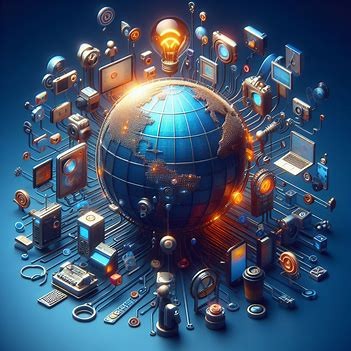
Throughout history, there have been moments of profound transformation that have altered the course of human civilization. These paradigm shifts have reshaped our world, challenging old beliefs and ushering in new opportunities. From the invention of the printing press to the Industrial Revolution, these milestones have affected technology and science and influenced social and cultural norms. This article explores the most monumental paradigm shifts in history that have redefined our world. We delve into the key events and ideas that have shaped our societies, economies, and ways of thinking. (Estimated reading time: 12 minutes)
“The world belongs to humanity, not this leader, that leader, kings or religious leaders. The world belongs to humanity.”
– Dalai Lama
Throughout history, significant moments have changed the trajectory of human civilization. These pivotal shifts have redefined our world, challenged established beliefs, and opened up new possibilities.
From the invention of the printing press to the Industrial Revolution, these milestones have not only impacted technology and science, but also shaped social and cultural norms. But paradigm shifts don’t happen without growing pains. Those who strived to transform the way we think and live have frequently faced resistance for the danger they represented to established norms.
A notable example of someone responsible for monumental paradigm shifts in history is the astronomer Galileo Galilei. In a letter to the Grand Duchess Christina of Tuscany, Galileo expressed his frustration with authorities who supported Biblical authority and disregarded scientific evidence. He wrote:
“I do not feel obliged to believe that the same God who has endowed us with senses, reason and intellect has intended us to forego their use and by some other means to give us knowledge which we can attain by them. He would not require us to deny sense and reason in physical matters which are set before our eyes and minds by direct experience or necessary demonstrations.”
Born in Italy, Galileo Galilei made groundbreaking discoveries using a telescope he modeled to magnify objects twenty times more than previously possible. This helped him discover Saturn’s rings and Jupiter’s four primary moons, now known as the Galilean moons. Galileo also made discoveries that revolutionized astronomy and confirmed the heliocentric system proposed by his predecessor, Nicolas Copernicus.
Galileo’s opposition to the view that the Earth was at the center of everything, however, led to a reformation against him. He angered religious authorities because his theory ran contrary to accepted scripture.
The Roman Catholic Church convicted Galileo of heresy, and he found himself embroiled in an ongoing struggle to defend science from religious prejudice. The Inquisition forced him to deny his views and condemned him to house arrest for the rest of his life.
Galileo’s story is a powerful reminder that it takes courage to question established views, ideas, and methods. However, making progress demands that we be willing to modify our current beliefs and systems, embracing these changes wholeheartedly before sharing them with others.
Paradigm shifts occur gradually through a series of questions, eventually leading to a surge of changes. In astrophysics, trailblazers such as Galileo laid the groundwork for modern scientists like Albert Einstein, Carl Sagan, and Neil DeGrasse Tyson, who have all contributed hugely to the field of astronomy.
In the present day, paradigm shifts extend beyond science and can just as readily apply to unexpected political outcomes or emerging artistic trends. Still, the essence of a paradigm shift remains the same across all disciplines: it signifies a radical change from established beliefs that form the foundation for a new standard.
Discovering significant paradigm shifts in history can offer valuable insights and inspiration. As you travel through these transformative moments, consider how you might incorporate this revolutionary thinking into your own life.
By stepping outside the conventional boundaries, you have the power to spark changes that can positively impact both yourself and those around you.
8 Monumental Paradigm Shifts in History That Redefined Our World
1. The Agricultural Revolution – shifting from hunter-gatherer societies

The Agricultural Revolution occurred around 10,000 BCE and was a significant turning point in human history. It represented a shift from a nomadic lifestyle of hunting and gathering to establishing settled farming communities.
This transformation allowed for the domestication of various plants and animals, allowing people to grow crops and raise livestock, significantly boosting food production. The reliability of food sources led to population growth and the establishment of permanent settlements, laying the groundwork for the rise of civilizations.
As communities expanded, they formed social structures and hierarchies that hadn’t existed before. With the capacity to generate surplus food, not everyone had to focus on farming; this opened the door for specialized roles like artisans, traders, and leaders to emerge.
The stability brought by agricultural life encouraged technological progress and cultural development. Innovations like plows and irrigation systems signified the start of a closer relationship with the environment, leading to increased productivity and efficiency.
The Agricultural Revolution significantly impacted human health and the structure of society. While an agriculture-based diet could support larger populations, it also introduced new issues, like an increase in the spread of disease in more crowded living environments.
As communities grew more complex, their systems of governance and social customs evolved as well. The establishment of property rights and land ownership came into play, shaping future economic systems and contributing to social disparities. This revolution was more than just a shift to farming; it fundamentally transformed the fabric of human life.
2. The Industrial Revolution – mechanizing production and transforming society
The Industrial Revolution, which started in the late 18th century, marked a significant turning point that profoundly changed global society. A shift from manual labor to machine-based production defined this era, giving rise to factories and mass production.
Steam power and mechanized equipment transformed industries like textiles, iron, and coal mining, resulting in a remarkable increase in productivity. These technological innovations redefined the production of goods and reshaped labor dynamics and economic systems.
As factories proliferated, many people moved from the countryside to cities in search of employment. This shift towards urban living transformed population dynamics, leading to the emergence of new social classes, particularly a growing working class that would play a pivotal role in shaping future labor rights movements.
The clear divide between wealthy industrialists and struggling workers brought attention to severe social inequalities, igniting conversations about workers’ rights and the necessity for reform. This era witnessed the rise of capitalism, driven by investment and profit; motives that fueled further innovation and economic expansion.
The Industrial Revolution brought about significant changes that extended well beyond just the economy. It reshaped cultural and social norms, altering how individuals connected with each other and their surroundings. With the growing need for skilled labor, education became more widely available, leading to higher literacy rates.
On the flip side, the swift pace of industrial growth resulted in environmental harm, sparking early conversations about sustainability and the moral implications of industrial activities. Ultimately, this revolution set the stage for the modern economy and the social changes that emerged in the 19th and 20th centuries.
3. The Information Age – the rise of computers and the internet in paradigm shifts in history

The Information Age, which started in the second half of the 20th century, marked the beginning of a new period defined by swift technological progress, especially in computing and telecommunications. Computers have changed the way we process, store, and share information.
With the internet emerging in the 1990s, access to information became instantaneous, leading to significant shifts in communication, business, and education. This transformation reshaped global interactions and made knowledge more accessible, allowing people from all backgrounds to get and exchange information.
As the internet became a vital aspect of everyday life, it revolutionized existing industries and gave birth to new ones like e-commerce, online learning, and digital marketing. The operations of businesses transformed significantly. Companies gained the ability to effortlessly access global markets, while consumers could easily compare products and prices with just a click.
This newfound accessibility encouraged innovation and entrepreneurship, paving the way for the emergence of tech giants and a fresh economy fueled by digital services and information technology.
The Information Age has significantly transformed how we communicate and build relationships. With the rise of social media platforms, people can now connect with others worldwide, share their experiences, and rally around shared interests.
However, this shift has also brought about worries regarding privacy, the spread of misinformation, and the effects of technology on our mental well-being and social connections. As we move through this age of rapid information exchange, it’s crucial to thoughtfully consider how technology influences our lives and the future of communication.
4. The Digital Revolution – the dawn of the smartphone era
The Digital Revolution, starting in the late 20th century, signifies a significant shift in the Information Age, characterized by the widespread use of digital technology and the rise of smartphones. These handy devices have revolutionized our communication, work, and interaction with the world. As smartphones have become ubiquitous, we can now easily access a wealth of information and services, profoundly altering everyday life and how we connect.
Smartphones have revolutionized communication and have brought about innovative ways to enjoy entertainment, shop, and connect socially. A wide range of applications now support almost every facet of our lives, including banking and fitness, opening up new avenues for businesses and entrepreneurs alike. The gig economy has thrived, allowing people to use technology for freelance jobs and side projects, changing the landscape of traditional employment and labor markets.
The Digital Revolution has brought to light pertinent issues surrounding privacy, data security, and the effects of constant connectivity on our mental health. As people grow more dependent on digital devices, concerns around addiction, social isolation, and the quality of our relationships have become more prominent.
The digital divide reveals inequalities in access to technology, emphasizing the disparities in our interconnected world. To navigate this complex digital environment effectively, it’s important to reflect on how technology influences societies and the values you cherish.
5. The Green Revolution – advancements in agriculture and sustainability
From the 1940s to the late 1960s, the Green Revolution brought about significant advancements in farming methods and technologies designed to increase food production. This initiative introduced high-yield crop varieties, chemical fertilizers, and advanced irrigation methods, transforming global food production. The primary aim was to fight hunger and improve food security, especially in developing countries, by increasing agricultural output.
The Green Revolution had a significant impact, resulting in substantial increases in crop yields and playing a crucial role in reducing famine in various regions globally. Nations such as India and Mexico experienced impressive food production advancements, which fostered economic growth and stability. Adopting mechanized farming techniques and scientific approaches transformed agriculture, allowing farmers to generate higher outputs with fewer resources, thus supporting larger populations.
However, the Green Revolution was not without its challenges and criticisms. The heavy use of chemical inputs sparked concerns regarding environmental sustainability, soil health, and the potential health hazards linked to pesticide use. Moreover, the emphasis on monoculture and high-yield crops often sidelined traditional farming methods and reduced biodiversity.
As we confront global issues like climate change and food insecurity, the insights gained from the Green Revolution are vital for developing future agricultural practices that harmonize productivity with environmental care.
6. The Civil Rights Movement – redefining equality and human rights
The Civil Rights Movement, which took place primarily in the United States during the 1950s and 1960s, marked a pivotal chapter in the fight for equality and social justice. This movement aimed to eliminate racial discrimination and segregation, championing the rights of African Americans and other underrepresented communities.
Activists employed peaceful protests, legal challenges, and grassroots organizing to challenge systemic racism and secure equal rights for all. It energized a generation and sparked similar movements for justice globally.
Prominent leaders like Martin Luther King Jr., Rosa Parks, and Malcolm X became influential advocates for social change. Their efforts led to landmark legislation, like the Civil Rights Act of 1964 and the Voting Rights Act of 1965, aimed at eradicating discrimination and safeguarding the rights of African Americans. This movement not only brought attention to the injustices endured by Black Americans, but also questioned societal norms, sparking widespread conversations about human rights and equality.
The Civil Rights Movement had a far-reaching influence that went beyond the borders of the United States, inspiring justice and equality movements worldwide. It started meaningful discussions about intersectionality, highlighting the importance of tackling issues related to race, class, gender, and sexuality in the pursuit of social justice.
Although considerable advancements have been achieved, the movement’s legacy remains relevant today as people and organizations work to confront persistent inequalities and promote a just and more equitable society.
7. The Feminist Movement – challenging gender norms and empowering women

The Feminist Movement, which gained traction in the late 1800s and continued to grow throughout the 20th century, helped to question conventional gender roles and promoted women’s rights. This movement aimed to tackle various issues, including the right to vote, reproductive freedoms, equality in the workplace, and gender-based violence. Through activism, education, and legislative initiatives, feminists have dedicated themselves to breaking down the systemic barriers that have long oppressed women and marginalized communities.
The first wave of feminism concentrated mainly on legal disparities, particularly the struggle for voting rights. Pioneering figures like Susan B. Anthony and Emmeline Pankhurst were central to the suffragette movement, which set the stage for future advocacy.
The second wave, which began in the 1960s and 1970s, broadened its scope to address social and cultural inequalities, bringing attention to issues like reproductive rights and discrimination in the workplace. This era of the movement produced significant works, including Betty Friedan’s “The Feminine Mystique,” which ignited vital conversations about the roles of women in society.
The feminist movement has continued to grow, with an increased focus on intersectionality and the distinct challenges encountered by women from various races, classes, and sexual orientations. The MeToo movement has highlighted the critical issues of sexual harassment and assault, underscoring the importance of accountability and the need for systemic reform.
As society continues to confront gender equality issues, the feminist movement plays a crucial role in championing women’s rights and opposing the oppressive systems that perpetuate inequality.
8. The Scientific Revolution – Changing the way we understand the world
From the 16th and 18th centuries, the Scientific Revolution represented a significant transformation in humanity’s perception of the natural world. During this time, there was a move away from traditional beliefs tied to religion and superstition, leading to a more evidence-based approach to knowledge that emphasized observation and experimentation. Pioneering thinkers like Galileo Galilei, Isaac Newton, and Johannes Kepler established the groundwork for modern science, profoundly changing our comprehension of physics, astronomy, and biology.
The advancement of the scientific method was vital in this change, highlighting the importance of systematic observation, measurement, and experimentation. This method of inquiry led to significant discoveries and encouraged a culture of skepticism and critical thinking that challenged established authority. The release of influential works like Newton’s “Principia Mathematica” and Galileo’s “Dialogue Concerning the Two Chief World Systems” offered fresh perspectives on the laws of the universe, setting the stage for future scientific progress.
What we can take away from these paradigm shifts in history
The implications of the Scientific Revolution reached far beyond the realm of science. It had a significant effect on philosophy, politics, and society as a whole. The focus on reason and evidence-driven thinking led to the Age of Enlightenment, helping shape modern ideas about democracy and human rights. As we continue to explore the universe and expand our knowledge, the legacy of the Scientific Revolution is still evident in our ongoing search for understanding and truth.
The monumental paradigm shifts throughout history have redefined our world, influencing not only the present, but the trajectory of our future. By understanding these transformative paradigm shifts in history, you can better appreciate the complexities of our current landscape and the potential for further change.
The journey of human civilization is far from over. As you and I continue to adapt and evolve, we hold the power to shape a world that reflects our values and aspirations for generations to come.
All my best on your journey,
Seline

Question for you: Which era do you think created the most significant paradigm shift in history, and why?
Did you like this post? Sign up below, and I’ll send you more awesome posts like this every week.

This was really interesting to read! I enjoyed it a lot and had never thought of a lot of these things this way before. Thank you for bringing this to everyone’s attention in a fun and interesting way!